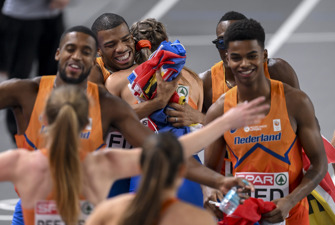New SAPIS report highlights that many athletes still lack influence and points to ways forward for better athlete representation
The concluding report from the SAPIS project to strengthen athlete power in sport shows there has been progress in athlete representation over the past ten years but there is still a long way to go - particularly when it comes to sports federations recognising athlete unions.
Although there has been progress in athlete representation over the past decade, research from the project 'Strengthening Athlete Power in Sport' (SAPIS) shows that a substantial number of athlete representatives experience constraints on their ability to represent their fellow athletes and take part in decision-making processes in sports organisations.
In a survey with replies from 146 athlete representatives in 122 different organisations, the vast majority believe that they make a meaningful contribution to serving the needs of athletes. However, a substantial group (about 15 to 20%) still experience that they are not formally part of the decision-making in the organisation in which they represent athletes, and they cannot put forward their own proposals, get information about the decision-making process, or appeal decisions that directly affect athletes.
“Although some positive change has happened in recent years, one fundamental problem remains: Sports federations typically refuse to acknowledge athlete unions. This is not only a breach of association freedom and human rights. Our research shows that full-time or part-time professionals lag dramatically behind the working conditions that other groups in democratic societies enjoy," says Play the Game’s international director Jens Sejer Andersen, who has acted as project coordinator.
The survey is part of the final report from the SAPIS project, initiated in 2020 to strengthen the influence and representation of athletes in the governance and management of their sports organisations.
The report offers a comprehensive analysis of the position of athletes and the ways they can influence sports governance. It draws on literature about stakeholder representation across different sectors in society to illuminate possible platforms for athletes to engage effectively in sports governance. The report also contains interviews with athlete representatives from both sports federations and athlete associations (unions) about the informal practices that such actors must navigate to get influence.
Finally, the report provides examples of good practices in athlete representation through six case studies of different athlete organisations, nationalities, and sports disciplines.
Mike McNamee, professor at Swansea University and KU Leuven and the project’s scientific coordinator, emphasises how the SAPIS project can be used by both athletes, athlete representatives and sports organisations:
“The SAPIS project has set out the different ways in which the voices and rights of athletes can be better promoted and protected across the diverse range of sport authorities whether as governing bodies, leagues, clubs and/or public authorities. The SAPIS report provides an in-depth interdisciplinary insight to support efforts to enhance athlete power in sport by promoting strong networks and good practices in more democratic and empowering ways.”
Findings will be disseminated at SAPIS conference on 28 September
To conclude the SAPIS project, a dissemination conference will be held in Leuven on 28 September 2023 during the European Week of Sport. Here, international speakers will share their own experiences of successful athlete representation, debate the rights and influence of athletes, and reflect on future directions of sports governance.
Conference participation is EUR 70 which covers:
- All programme activities
- Print versions of the SAPIS good practice guide and the final report
- Coffee breaks and lunch
All participants are also invited to join in a networking dinner after the conference for the price of EUR 65.
The conference is co-hosted by the Interdisciplinary Centre for Ethics and Regulation in Sport (ICERiS) at KU Leuven and takes place at the Faculty Club, a UNESCO World Heritage site.
SAPIS partners
- European Elite Athletes Association
- JPY - Football Players Association of Finland
- NOC*NSF - The Dutch Olympic Committee*Dutch Sports Federation
- Pompeu Fabra University, Spain
- Swansea University, United Kingdom
- University of Ljubljana, Slovenia
- Utrecht University, the Netherlands
- Play the Game (project coordinator)
The project is co-funded by the European Union's Erasmus+ programme with a grant of approximately 251,000 euro.

